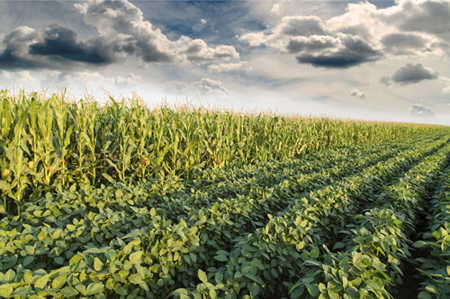 (Wall Street Journal) – Argentine President Mauricio Macri on Monday eliminated export taxes on beef, corn and other farm products, a move that could dramatically boost the country’s agricultural output.
(Wall Street Journal) – Argentine President Mauricio Macri on Monday eliminated export taxes on beef, corn and other farm products, a move that could dramatically boost the country’s agricultural output.
Standing in front of a row of green corn stalks at a farm a few hours northwest of this capital, Mr. Macri, who was sworn into office last week, fulfilled one of his top campaign promises by ending the taxes.
“We can double food production in Argentina,” Mr. Macri told a gathering of farmers. “Let’s produce more. There are no excuses now.”
Argentina produces around 100 million tons of grain and soybeans annually, making it one of the world’s leading farm exporters.
Eliminating the taxes, which currently range from 15% to 23%, could help boost production to 180 million tons by 2025, says Ivan Ordoñez, an analyst at I+E Consultores who co-wrote a book on Argentina’s agribusiness potential.
“This is very important. It’s a diametrical change in the way the public sector regulates the agribusiness,” Mr. Ordoñez said. “We’re going to become more competitive and recover a lot of investment.”
The taxes—especially a 35% tax on soybeans—have been a central part of Argentina’s economic policy for more than a decade. Mr. Macri said he would cut that tax to 30% and reduce it an additional five points annually in coming years.
In a separate speech later Monday to industrialists, he also said he would eliminate export taxes on manufactured goods.
Former President Cristina Kirchner used the agricultural taxes to fund ambitious social programs and redistribute wealth, and often said farmers critical of taxes were “oligarchs” who had no interest in poor Argentines.
In 2008, when the government tried putting a sliding-scale tax on soybeans exports, farmers shut down roads and bridges nationwide, blocking the shipment of grains and beef. Mrs. Kirchner called them “coup-mongers.”
Mr. Macri has vowed to expand the social programs, but said that taxing exports stunts economic growth by limiting farm output. Mr. Ordoñez says the taxes, along with an earlier ban on beef and wheat exports, cost Argentina around $40 billion in lost production.
Once famous world-wide for its tenderloins, Argentina saw its beef output fall behind that of its much smaller neighbors, Paraguay and Uruguay, as ranchers here ditched cattle in favor of more lucrative crops like soybeans.
The number of cattle has fallen by around 10 million and 138 meatpacking plants went out of business, according to Argentina’s Rural Society.
Those trends could reverse as farmers plant more corn and wheat and start raising cattle again.
Mr. Macri had a more pressing reason to eliminate the taxes: a desperate need to obtain U.S. dollars. Amid rising demand for dollars, the stock of greenbacks at Argentina’s central bank has dropped to less than $25 billion from more than $52 billion in 2011.
The lack of dollars, which are needed to make debt payments and pay for imports, has choked the economy and forced the Mr. Macri administration to seek fresh financing.
The government hopes that removing the taxes will encourage farmers and agribusiness companies to quickly sell billions of dollars worth of grain as exports.
Last month, Argentina’s tax collection agency estimated that Argentines had been hoarding around $13 billion in farm goods, mostly in expectations that the government would devalue the currency.
When companies export grains, dollars from the sales go to the central bank, which provides sellers with pesos at the official exchange rate, currently about 9.8 to the dollar. Economists expect that rate to slide to closer to 15.
“Cutting taxes gives you incentive to sell, but a lot of people will wait until it is clear what the exchange rate will be,” said Andres Rosengberg, 42, who manages a farm in the province of Buenos Aires.
The tax cuts are part of a broader plan by the Macri administration to obtain more than $5 billion in fresh financing from international banks to bolster the central bank’s foreign currency reserves. The government also plans to slash subsidies for gas and electricity, which would save billions in state spending.
Mr. Rosengberg says he stopped raising cattle about 10 years ago after the taxes made it too costly. He may now reconsider producing beef again.
“This improves the outlook for everyone,” he said on Monday. “Surely production will rise. Macri kept his word, giving him credibility. I’m pleased about this.”




